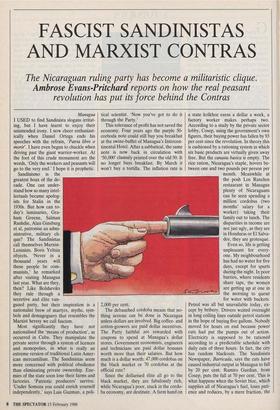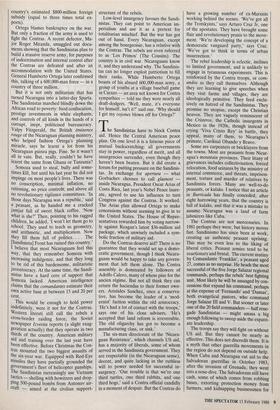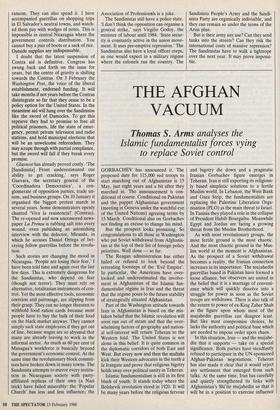FASCIST SANDINISTAS AND MARXIST CONTRAS
The Nicaraguan ruling party has become a militaristic clique.
Ambrose Evans-Pritchard reports on how the real peasant
revolution has put its force behind the Contras
Managua I USED to find Sandinista slogans irritat- ing, but I have learnt to enjoy their unintended irony. I now cheer enthusiast- ically when Daniel Ortega ends his speeches with the refrain, Paula libre o morir'. I have even begun to chuckle when driving past the giant warrior-worker. At the foot of this crude monument are the words, 'Only the workers and peasants will go to the very end.' I hope it is prophetic.
Most significantly they have not nationalised the 'means of production', as occurred in Cuba. They manipulate the private sector through a system of licences and monopolies, in what is really an extreme version of traditional Latin Amer- ican mercantilism. The Sandinistas seem more concerned with political obedience than eliminating private ownership. Ene- mies of the state soon lose their farms and factories. 'Patriotic producers' survive. `Under Somoza you could enrich yourself independently,' says Luis Guzman, a poli- tical scientist. Now you've got to do it through the Party.'
This tolerance of profit has not saved the economy. Four years ago the purple 50- corboda note could still buy you breakfast at the swine-buffet of Managua's Intercon- tinental Hotel. After a sabbatical, the same note is now back in circulation with `50,000' clumsily printed over the old 50. It no longer buys breakfast. By March it won't buy a tortilla. The inflation rate is 2,000 per cent.
The debauched cordoba means that no- thing serious can be done in Nicaragua unless dollars are involved. Big coffee- and cotton-growers are paid dollar incentives. The Party faithful are rewarded with coupons to spend at Managua's dollar stores. Government economists, engineers and technicians are paid dollar bonuses worth more than their salaries. But how much is a dollar worth: 47,000 cordobas on the black market or 70 cordobas at the official rate?
Since the dollarised elite all go to the black market, they are fabulously rich, while Nicaragua's poor, stuck in the cordo- ba economy, are destitute. A farm hand on Even so, life is getting unpleasant for every- one. My neighbourhood has had no water for five days, except for spurts during the night. In poor barrios, where residents share taps, the women are getting up at one in the morning to queue for water with buckets. Petrol was all but unavailable today, ex- cept by bribery. Drivers waited overnight in long coiling lines outside petrol stations in the hope of buying five gallons. Nobody moved for hours on end because power cuts had put the pumps out of action. Electricity is supposed to be rationed according to a predictable schedule with daily cuts of three hours. In fact, the city has random blackouts. The Sandinista Newspaper, Barricada, says the cuts have caused industrial output in Managua to fall by 20 per cent. Ramiro Gurdian, from Cosep, puts the fall at 70 per cent. This is what happens when the Soviet bloc, which supplies all of Nicaragua's fuel, loses pati- ence and reduces, by a mere fraction, the country's estimated $800-million foreign subsidy (equal to three times total ex- ports).
Ortega blames bankruptcy on the war.
But only a fraction of the army is used to fight the Contras. A recent defector, Ma- jor Roger Miranda, smuggled out docu- ments showing that the Sandinistas plan to build a massive reserve army, for purposes of indoctrination and internal control after the Contras are defeated and after an accommodation with the United States.
General Humberto Ortega later confirmed this, talking of a 600,000-man force — in a country of three million.
But it is not only militarism that has turned Nicaragua into a latter-day Sparta.
The Sandinistas marched blindly down the African road to poverty: food confiscation, prestige investments in white elephants, and controls of all kinds in the hands of a corrupt, inept, politicised bureaucracy. Valpy Fitzgerald, the British eminence rouge of the Nicaraguan planning ministry, who helped fashion Ortega's planning miracle, says he learnt a lot from his Nicaraguan guinea pigs. Fine. So it wasn't all in vain. But, really, couldn't he have learnt the same from Ghana or Tanzania? Somoza used to steal, bully and some- times kill, but until his last year he did not impinge on most people's lives. There was no conscription, minimal inflation, no rationing, no price controls', and above all no revolutionary vigilance committees. 'In those days Nicaragua was a republic,' said a peasant, as he handed me a cracked jamjar full of sweet black coffee. 'Now what is she?' Then, pointing to his ragged children, he added, 'I won't let them go to school. They used to teach us geometry, and arithmetic, and multiplication. Now they fill them full of politics. . . . The [Sandinista] Front has ruined this country.' I believe that most Nicaraguans feel this way, that they remember Somoza with increasing indulgence, and that they long to be rid of this burdensome, militaristic juventocracy. At the same time, the Sandi- nistas have a hard core of support that Somoza lacked. American intelligence claims that the comandantes estimate their own active base at between 15 and 20 per cent.
This would be enough to hold power indefinitely, were it not for the Contras. Western literati still call the rebels a cross-border raiding force; the Soviet newspaper Izvestia reports (a slight exag- geration actually) that they operate in two thirds of the country. American military aid and training over the last year have been effective. Before Christmas the Con- tras mounted the two biggest assaults of the six-year war. Equipped with Red-Eye missiles they have partially grounded the government's fleet of helicopter gunships. The Sandinistas increasingly use Vietnam tactics — shelling with howitzers and drop- Ping 500-pound bombs from Antonov air- craft — aimed at the civilian support- structure of the rebels.
Low-level insurgency favours the Sandi- nistas. They can point to American im- perialism and use it as a pretext for totalitarian mischief. But the war has got out of hand. Every Nicaraguan, except among the bourgeoisie, has a relative with the Contras. The rebels are even referred to as 'Los Primos' (The Cousins). The country is in civil war. Nicaraguans know it, and they understand why. The Sandinis- tas can no longer exploit patriotism to fill their ranks. While Humberto Ortega boasts of his absurd 600,000-man army, a group of youths at a village baseball game in Carazo — an area not known for Contra sympathies — told me they were nearly all draft-dodgers. 'Well, mate, it's everyone for himself, isn't it?' said one. 'Why should I get my cojones blown off for Ortega?'
The Sandinistas have to block Contra aid. Hence the Central American peace plan. On one level it is a fatuous piece of mutual backscratching: all governments stay in power, regardless of merit, and all insurgencies surrender, even though they haven't been beaten. But it did create a forum for putting pressure on the Sandinis- tas. In exchange for apertura — what Gorbachev chooses to call glasnost inside Nicaragua, President Oscar Arias of Costa Rica, last year's Nobel Peace laure- ate, agreed to use his influence to turn Congress against the Contras. It worked. The Arias plan allowed Ortega to make concessions without seeming t vein to the United States. The House o e,_ sentatives rewarded him by voting narrow- ly against Reagan's latest $36-million aid package, which unwisely included a sym- bolic fraction of military aid.
Do the Contras deserve aid? There is no guarantee that they would set up a demo- cratic government, though I think Nicara- guans would be happy to take any govern- ment that left them alone. The Contra assembly is dominated by followers of Adolfo Calero, many of whom pine for the ancien regime. But not all think they can return the haciendas to their former own- ers. Aristides Sanchez, once a conserva- tive, has become the leader of a 'mod- ernist' faction within the old aristocracy. 'He's had a lot of contact with the troops,' says one of his close advisers. 'He's accepted that land reform is irreversible. The old oligarchy has got to become a manufacturing class, or sink.'
The six-man directorate of the 'Nicara- guan Resistance', which channels US aid, has a majority of liberals, some of whom served in the Sandinista government. They are respectable (in the Nicaraguan sense), decent, and quite lacking in the ruthless will to power needed for successful in- surgency. 'Our trouble is that we're one third turtles, one third rabbits, and one third hogs,' said a Contra official candidly in a moment of despair. But the Contras do have a growing number of ex-Marxists working behind the scenes. 'We've got all the Trotskyists,' says Arturo Cruz Jr, one of the apostates. They have brought some flair and• revolutionary praxis to the move- ment. 'We're developing the concept of a democratic vanguard party,' says Cruz. `We've got to think in terms of urban insurrection.'
The rebel leadership is eclectic, inclines to limited government, and is unlikely to engage in tyrannous experiments. This is reinforced by the Contra troops, or com- andos as they call themselves. Although they are learning to give speeches when they visit farms and villages, they are ideologically primitive. They feed exclu- sively on hatred of the Sandinistas. They promise no utopias, except the Christian heaven. They are vaguely reminiscent of the Cristeros, the Catholic insurgents in Mexico in the 1920s, though instead of crying 'Viva Cristo Rey' in battle, they appeal, many of them, to Nicaragua's primate, Cardinal Obando y Bravo.
Some are carpenters or bricklayers from the towns. Most are peasants from Nicar- agua's mountain provinces. Their litany of grievances includes collectivisation, forced relocation, food seizures by the ministry of internal commerce, and threats, imprison- ment, torture and murder of relatives by Sandinista forces. Many are well-to-do peasants, or kulaks. I notice that an article in Barricada has finally conceded, after eight harrowing years, that the country is full of kulaks, and that it was a mistake to assume Nicaragua was a land of farm __labotrers like Cuba.
The Contras are not mercenaries. In 1981 perhaps they were, but history moves fast. Sandinismo has since been at work, creating an authentic peasant uprising. This may be even less to the liking of liberal critics. Peasant armies tend to be reactionary and brutal. The current mutiny by Comandante 'Franklin', a peasant aged 27, comes as no surprise:He heads the most successful of the five Jorge Salazar regional commands, perhaps the rebels' best fighting unit. Most likely he will be assuaged by con- cessions that expand his command, perhaps at the expense of 'Fernando' and 'Dumas', both evangelical pastors, who command Jorge Salazar III and V. But sooner or later one of the 20 field commanders — half rene- gade Sandinistas — might amass a big enough following to sweep aside the expatri- ate leadership.
The troops say they will fight on without US aid. But they cannot be nearly as effective. This does not discredit them. It is a myth that other guerrilla movements in the region do not depend on outside help. When Cuba and Nicaragua cut aid to the Salvadoran guerrillas in October 1983, after the invasion of Grenada, they went into a nose-dive. The Salvadorans still have cash, some of which comes from robbing buses, extorting protection money from farmers, and kidnapping businessmen for ransom. They can also spend it. I have accompanied guerrillas on shopping trips in El Salvador's neutral towns, and watch- ed them pay with wodges of notes. This is impossible in central Nicaragua where the government controls distribution. You cannot buy a pair of boots or a sack of rice. Outside supplies are indispensable.
I doubt that the latest suspension of Contra aid is definitive. Congress has swung back and forth on the issue for years, but the centre of gravity is shifting towards the Contras. On 3 February the Washington Post, the voice of the liberal establishment, endorsed funding. It will take months if not years before the Contras disintegrate so far that they cease to be a policy option for the United States. In the meantime aid will hang over the Sandinistas like the sword of Damocles. To get this reprieve they had to promise to free all political prisoners, life the state of emer- gency, permit private television and radio stations, and hold municipal elections that will be an unwelcome referendum. They may scrape through with partial compliance, but the sword will fall if they break every promise.
Glasnost has already proved costly. 'The [Sandinista] Front underestimated our ability to get cracking,' says Roger Guevara, the secretary general of the `Coordinadora Democratica', a con- glomerate of opposition parties, trade un- ions, and business groups. On 10 January it organised the biggest protest march in several years. Some demonstrators openly chanted 'Viva la resistencia!' (Contras). The re-opened and now uncensored news- paper La Prensa is rubbing salt into every wound, even publishing an astonishing interview with the defector, Miranda, in which he accuses Daniel Ortega of bet- raying fellow guerrillas before the revolu- tion.
Such stories are changing the mood in Nicaragua. 'People are losing their fear,' I have been told time and again over the last few days. This is extremely dangerous for the Sandinistas, who depend on fear (though not terror). They must rely on alternative, totalitarian instruments of con- trol. Yet the most effective tools, economic coercion and patronage, are slipping from their grasp. They can no longer threaten to withhold food ration cards because most people have to buy the bulk of their food on the black market anyway. They cannot simply sack state employees if they get out of line, because wages are so abysmal that many are already leaving to work in the informal sector. As much as 60 per cent of Managua's workforce is basically beyond the government's economic control. At the same time the revolutionary block commit- tees have broken down in many towns. The Sandinista attempts to mirror every institu- tion in Nicaraguan society with party- affiliated replicas of their own (a Nazi trick) have failed miserably: the 'Popular Church' has less and less influence; the Association of Professionals is a joke.
The Sandinistas still have a police state. `I don't think the opposition can organise a general strike,' says Virgilio Godoy, the minister of labour until 1984. 'State secur- ity is constantly active in the union move- ment. It uses pre-emptive repression.' The Sandinistas also have a loyal officer corps, as one would expect in a military regime where the colonels run the country. The Sandinista People's Army and the Sandi- nista Party are organically indivisible, and they can remain so under the terms of the Arias plan.
But is their army any use? Can they send tanks into the streets? Can they risk the international costs of massive repression? The Sandinistas have to walk a tightrope over the next year. It may prove impossi- ble.




























































 Previous page
Previous page